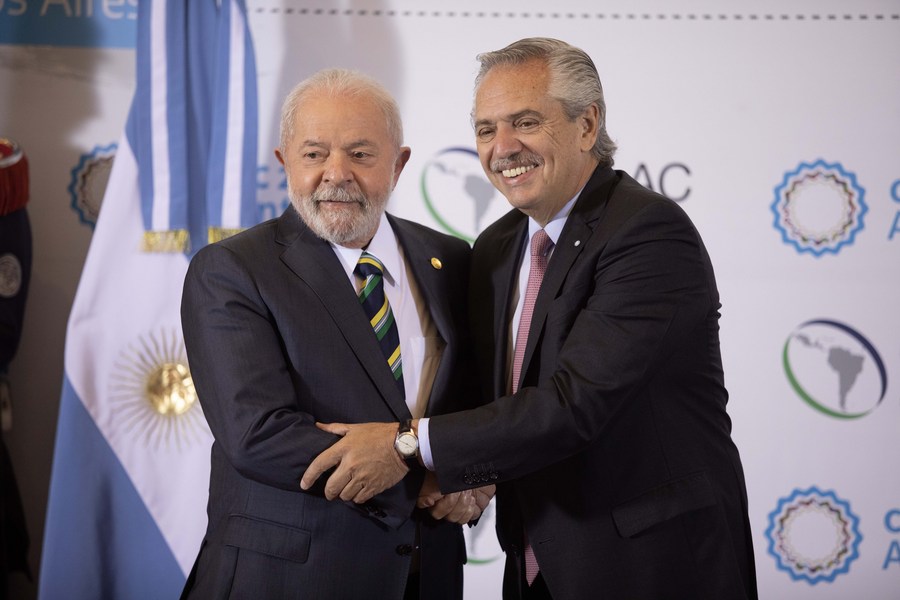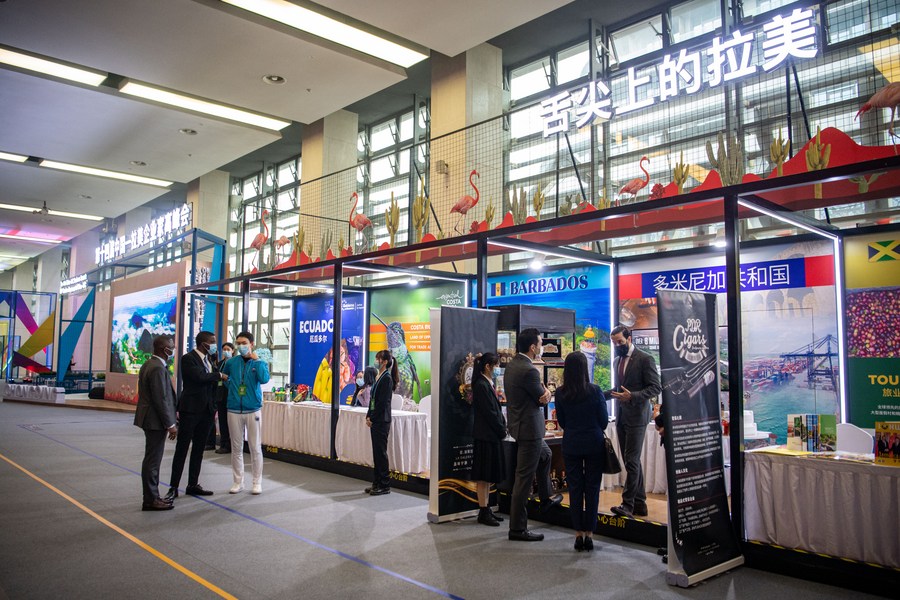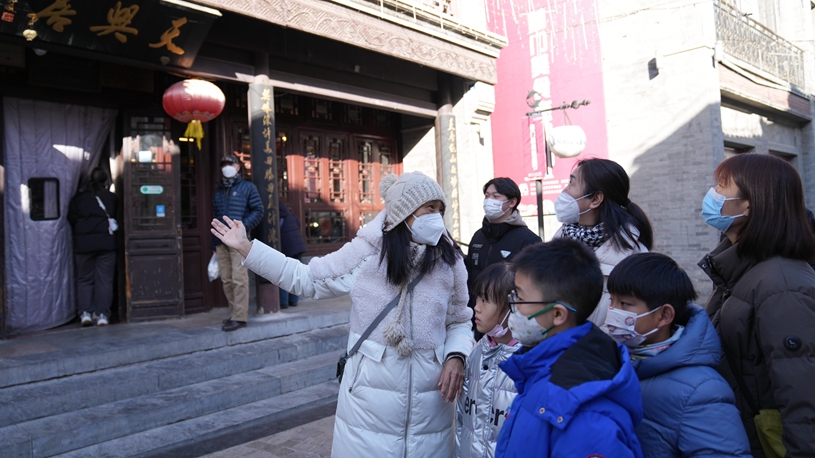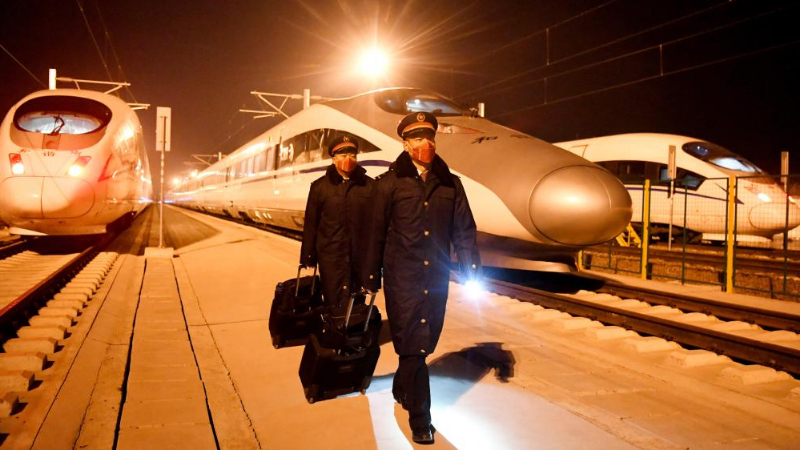
Brazilian President Luiz Inacio Lula da Silva (L) and Argentine President Alberto Fernandez pose for a photo during the welcoming ceremony of the seventh Summit of the Community of Latin American and Caribbean States (CELAC), in Buenos Aires, Argentina, Jan. 24, 2023. (Photo by Martin Zabala/Xinhua)
by Xinhua writer Zhao Kai
MEXICO CITY, Jan. 29 (Xinhua) -- The 7th Summit of the Community of Latin American and Caribbean States (CELAC), which was held Tuesday in Buenos Aires, demonstrated the will of the regional countries to strengthen solidarity, promote integration, oppose foreign interference, and enhance cooperation, analysts said.
At the invitation of Argentine President Alberto Fernandez, Chinese President Xi Jinping delivered a video address to the summit, in which he said that China is ready to join hands with Latin American and Caribbean (LAC) countries to promote world peace and development, build a community with a shared future for mankind, and open up an even brighter future for the world.
BOOSTING REGIONAL INTEGRATION PROCESS
In his inaugural speech in the Argentine capital, Fernandez said that the LAC region is one of the most unequal ones in the world in terms of development. He called on CELAC member countries to move forward and establish a regional integration mechanism that protects the common interests and respects the diversity of the region.
Leaders affirmed in their respective speeches that the mechanism should strengthen coordination and cooperation, bring countries together to tackle global challenges, promote multilateralism, and focus on building world peace.
This year's Declaration of Buenos Aires demonstrated CELAC's commitment to strengthening unity on the basis of respecting "political, economic, social, and cultural diversity" to "advance with determination the integration process."
Argentine Foreign Minister Santiago Cafiero said that the declaration "is the fruit of dialogue and respect. It is the multilateralism of solidarity in the most vivid way that we practice and that we carry forward."
One of the most outstanding aspects of the meeting was Brazil's return to CELAC, after Jair Bolsonaro's government suspended its membership in 2020.
REJECTION OF FOREIGN INTERVENTION
The CELAC member countries also jointly opposed foreign intervention, hegemony, and any unilateral act that affects Latin American and Caribbean countries, and called for an end to the U.S. blockade against Cuba.
Former Bolivian Foreign Minister Fernando Huanacuni said that foreign interference and hegemony will never lead to economic and social stability, while the strengthening of South-South cooperation is the "key to the process of democratization and integration."
In December 2011, a total of 33 countries in Latin America and the Caribbean formally established CELAC during a meeting in Caracas, Venezuela.
"CELAC has an advantage, which is that the United States does not participate in it, so our countries do not have pressure from Washington to promote their regional and global integration with extra-regional partners," Argentine sociologist Marcelo Rodriguez said in an interview with Xinhua.
In a joint statement, the presidents of Argentina and Brazil confirmed that they are studying the possibility of establishing a common South American currency to boost cooperation in areas such as finance and trade, and to improve their capacity to respond to external shocks.

People visit an exhibition during the 14th China-Latin America and the Caribbean Business Summit in southwest China's Chongqing on Nov. 16, 2021. (Xinhua/Tang Yi)
BRIGHT FUTURE OF CHINA-CELAC COOPERATION
Since 2012, China has maintained its position as Latin America's second largest trading partner, and even during the COVID-19 pandemic, trade between China and the region continued to grow, with trade volume between the two sides exceeding 450 billion U.S. dollars for the first time in 2021.
In his video message to this CELAC summit, Xi stressed that China always supports the regional integration process of Latin America and the Caribbean, attaches high importance to developing relations with CELAC, and regards it as an important partner.
China has been working with the LAC countries to strengthen the construction of the China-CELAC Forum and take the China-LAC relationship into a new era characterized by equality, mutual benefit, innovation, openness, and benefits for the people.
Miguel Rodriguez MacKay, former Peruvian foreign minister, told Xinhua that Xi's message sent a strong signal to regional countries striving for common development and greater cooperation, providing an opportunity for them to strengthen cooperation with China and promote development and prosperity.
China's call for building a community with a shared future for mankind has been well received in the LAC region and more and more countries in the region are cooperating with China to promote the Belt and Road Initiative, the Global Development Initiative and the Global Security Initiative.
For Pamela Cristales, an academic from the Autonomous University of Yucatan in Mexico, China-CELAC cooperation well meets the development needs of regional countries, namely infrastructure and economic support, without imposing conditions.
As the world enters a new period of turbulent change and economic slowdown, developing countries will be most affected, making cooperation with China especially important for Latin American countries, said David Castrillon Kerrigan, a professor at the Externado University of Colombia. ■












